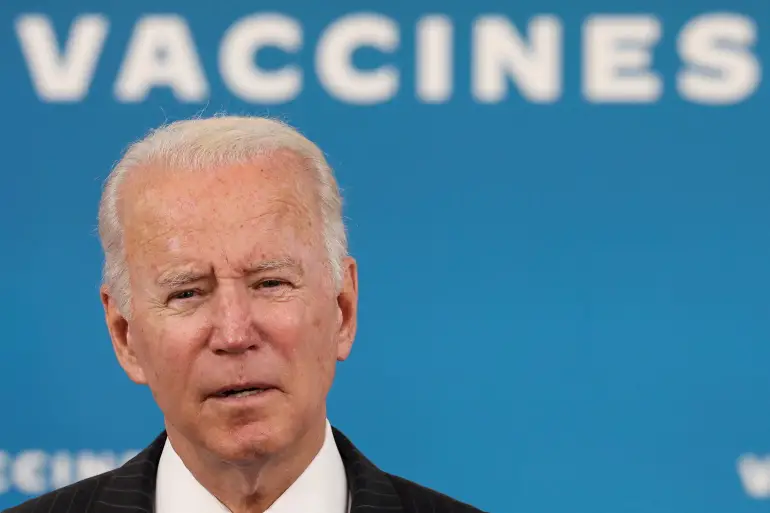In a late-breaking decision on Saturday, the Fifth Circuit Court of Appeals issued a temporary stay that halts the Biden administration’s vaccine mandate on businesses with more than 100 employees. The move is a result of a petition brought by five states and deals a direct but perhaps temporary blow to Biden’s executive order days after the rules and penalties were released by OSHA.
While the move has no immediate impact, the mandate does not go into effect until Jan. 4, it does signal that courts may be at least open to hearing arguments against the mandate if not outright skeptical to the legality of Biden’s order:
In the brief order, a three-judge panel on the Fifth Circuit Court of Appeals said that the petitioners in the case — Republican-led states and private businesses — “give cause to believe there are grave statutory and constitutional issues with the Mandate.”
The court asked the government to respond by 5 p.m. on Monday and said it would expedite the case. The court did not specify whether its order would have nationwide effect or would only apply to the states under its jurisdiction.
The Biden administration had announced earlier this week that its vaccine rules applying to private businesses with 100 or more employees, certain health care workers and federal contractors will take effect January 4.
Many legal analysts believe courts will be inclined to hear cases that challenge Biden’s vaccine mandate mainly because of the sweeping new powers being granted to OSHA and the emergency declaration used to create it. There was no act of Congress, this was simply Biden acting with his pen and his phone, a tactic of his former boss, President Obama.
In that regard, the employer vaccine mandate may be on some shaky legal ground if White House lawyers cannot prove the immediate and present danger required for OSHA to issue such sweeping and demanding rules on businesses:
The ruling from the United States Court of Appeals for the Fifth Circuit comes after at least two dozen state attorneys general threatened to sue the administration for federal overreach.
“Courts are skeptical because the law demands it,” the attorneys general wrote in a letter to Biden in September. “To justify an emergency temporary standard, OSHA must determine that ‘employees are exposed to grave danger from exposure to substances or agents determined to be toxic or physically harmful or from new hazards…’ and it must conclude that ‘such emergency standard is necessary to protect employees from such danger.’ You cannot plausibly meet the high burden of showing that employees in general are in grave danger.”
There are specific ways the law is written with regard to how much power OSHA has to regulate businesses and the safety of employees. The Biden administration is arguing that having unvaccinated employees at a workplace creates a situation of “grave danger” for surrounding employees. However, the question is whether the vaccine is designed to protect you or those around you, or both. If you’re vaccinated, and other mitigation measures are in place, it seems unreasonable to argue that some immediate and grave danger exists from an unvaccinated co-worker, especially for a virus with around a 99% survival rate among healthy individuals. Furthermore, can OSHA itself mandate employees undergo what amounts to a medical procedure to retain their employment?
The White House, of course, believes it will eventually prevail in court even despite the likelihood of setbacks along the way, such as Saturday’s temporary halt by the Fifth Circuit:
White House Deputy Press Secretary Karine Jean-Pierre responded to a question at a Friday press briefing about whether or not she is confident the mandate will stand up to legal challenges.
“We are very confident that it can,” Jean-Pierre said. “As for the legal side of this, let me be crystal clear to avoid what appears to be possible misinformation or disinformation around the emergency temporary standard being a vaccine mandate. That would be on its face incorrect as has been explicit for months. It is a standard for safe workplace to either comply with weekly testing or to be vaccinated.”
We’ve seen challenges to state Covid vaccine mandates get rejected by the Supreme Court already. The difference here is that we’re dealing with a federal mandate that lives under a very different constitutional standard. Rather than deferring to states’ rights, the Supreme Court would be dealing with whether the President has the constitutional authority to issue such a declaration through a federal workplace safety agency like OSHA.
The bottom line here is that this temporary stay is probably the first court decision of many to come. Given that the order is set to take effect in early January, we could see an expedited path for this case and the mandate could end up being blocked well past January until a higher court can rule.
Donate Now to Support Election Central
- Help defend independent journalism
- Directly support this website and our efforts
